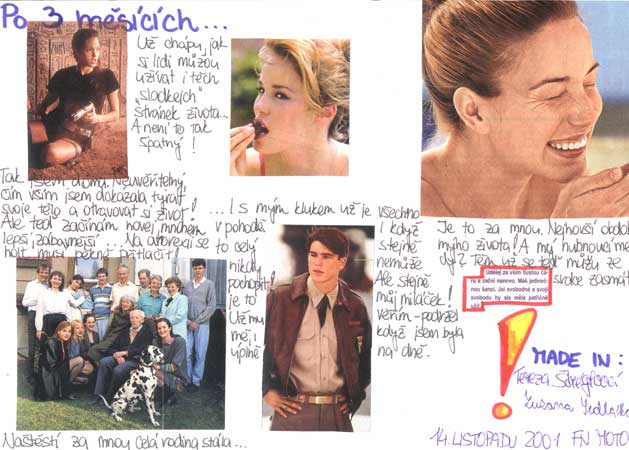íte pouze když máte hlad? Možná se vám bude zdát tato otázka hloupá, řada z vás by asi odpověděla, že jí samozřejmě když má hlad nebo když má příležitost se v klidu najíst. Podle průzkumu ale více než 20% tazatelů uvedlo, že jí, když k tomu mají úplně jiné důvody. Tak například když se cítí být ve stresu, když jsou osamělí, když se nudí, jsou unavení nebo společně jedí s někým, s kým si chtějí být v tu chvíli blíž. Jídlo pak neslouží k doplnění sil, energie, nasycení prázdného žaludku, ale ke změně nálady, pocitů, situace.
Takto s jídlem občas zacházíme asi všichni, jde o to, že si můžeme vypěstovat návyk, kterému se říká emoční jedení. Problém takového emočního jedlíka spočívá v tom, že konzumuje více jídla, než jeho tělo v rámci jeho životního stylu skutečně potřebuje. To se pak samozřejmě projeví nárůstem tělesné hmotnosti s následným rozvinutím pocitů vlastního selhávání, výčitek ze slabé vůle, negativního vnímání vlastního těla.
Možná znáte rčení: ‚Nežiji proto, abych jedl, ale jím pro to, abych žil‘. Je zde sice naznačeno, jak bychom měli s jídlem zacházet, ale realita je naštěstí trochu složitější. Vlivem naší výchovy (jídlo jako odměna či trest), nadbytkové kultury (netrpíme obvykle akutním nedostatkem jídla) nevnímáme stravu jako souhrn neživých látek – bílkovin, sacharidů, minerálů atd., ale jako něco, co by nám mělo chutnat, co by mělo dobře vypadat, na co se můžeme těšit. K jídlu máme prostě emoční vztah.
K jídlu se lidé obvykle obracejí, pokud cítí napětí, smutek, nudu, vztek, úzkost, ale také vzrušení, příjemné napětí a radost. Mnozí z nás si rádi dají své oblíbené jídlo, když se sami se sebou necítí dobře, takříkajíc si ‚spraví chuť‘.
Tak jak to tedy je? To samé chování je nejprve popsané jako problematické emoční jedení , následně pak se takto údajně chová většina z nás. Pravdou je, že v širším slova smyslu jsme emoční jedlíci skoro všichni, jídlo nám dokáže měnit naše nálady a nálady zase mají vliv na naše stravování. Problém ale nastává tehdy, když nejsme takovéto zacházení s jídle schopni kontrolovat, když pod vlivem emocí konzumujeme jídla moc a následně nás to dostává do potíží. Emoční jedení se tak stává zlozvykem, jídlo jakousi drogou pro utišení nepříjemných pocitů či stavů.
Je vám to povědomé? Pokud si chcete ověřit, jak na tom v tomto směru jste vy sami, můžete si vyzkoušet náš nový orientační test Jste emoční jedlík?
A jak z toho ven? Odpověď není složitá, jde o to znovu získat nad svým jedením kontrolu. Zvyky se ale obtížně mění, proto s tím možná budete potřebovat trochu pomoci. Nabízím několik doporučení.
1. Odpovězte si na otázku, proč nejčastěji jíte, když nemáte hlad
Nejprve se pokusíme zjistit, co vyvolává emoční jedení, o jaké jde situace. Jíte více v práci, protože jste ve stresu nebo se nudíte? Jíte bez velkého rozmýšlení, když se vrátíte domů do prázdného bytu a máte volný čas? Jíte ve škole, protože máte úzkost ze skoušení? Jíte hodně na večírku či oslavě, protože jste mezi lidmi nejistí a úzkostní?
Vezměte si tužku a papír, pokuste si vybavit co nejvíce situací, které máte spojené s větší konzumací jídla (myslí se tím jedení mimo snídaně / obědy / večeře), podtrhněte si ty, které se nejčastěji opakují.
Pokud to se změnou svého stravování myslíte vážně, můžete vyzkoušet stravovací deník. Jde o vedení jídelních záznamů – zaznamenáme si čas jídla, vše co sníme, místo, kde jíme, své pocity či myšlenky, které jídlo doprovází. Formulář pro takový deník najdete v sekci Ke stažení, ale dobře poslouží i obyčejný sešit. Po několika dnech záznamů (doporučuji tak 14 dní) si zápisky projděte a barevně podtrhejte situace, kdy jste jedli zbytečně navíc – které odpovídají emočnímu jedení. Můžete tak doplnit či rozšířit svůj seznam situací, které spouštějí emoční jedení.
2. Alternativa k jedení
Nyní je důležité postupně rozšiřovat svůj repertoár reakcí na nepříjemné emoce. Opět si můžete pomoci nejprve tužkou a papírem a začít vytvářet seznam aktivit, které budeme mít po ruce v situacích, spouštějících emoční jedení. Nabídnu vám nyní několik variant, vy jistě svůj osobní seznam obohatíte o další, které jsou více v sluladu s vašimi zájmy.
Cvičení uvolňuje napětí, působí relaxačně a zároveň je to dobrý zdroj energie, pokud jsme unaveni a nejde o vyčerpání z fyzické práce.
Kontakt s někým blízkým (partner, rodiče, kamarád…) vám dodá podporu a působí velmi dobře proti pocitu osamělosti.
Pití vody zaplní žaludek, což může snížit nutkavou chuť jíst, navíc velmi dobře působí proti únavě a zlepšuje náladu, řada z nás totiž přes den málo přijímá tekutiny (rozhodně se nepočítá káva, černý a zelený čaj, které naopak ještě více tělo odvodňují).
Vyrazit na procházku může být velmi uvolňující, navíc někdy velmi pomůže změna prostředí.
Poslech oblíbené hudby dokáže skvěle emocionálně přeladit, dodat energii, příjemně naplnit volný čas, určený k odpočinku.
Ovoce, bylinkové čaje nebo něco podobného, co nám chutná, zároveň nás nesytí kaloriemi.
Relaxační cviky, cvičení jógy je dobrý způsob jak uvolnit a pročistit tělo i mysl, umožňuje také odložit jednání po velkých emocích, kterého byste mohli litovat.
Pár doporučení na závěr
Emočním jedlíkem můžete být stále méně, pokud se budete snažit stravovat pravidelně – pocity hladu v delších pauzách mezi jídlem snižují odolnost vůči stresu, sami o sobě vzbuzují pocity podráždění a napětí a zvyšují neodolatelnou chuť k jídlu.
S tím také souvisí držení redukčních diet. Pokud trpíte nadváhou a uvědomujete si, že příčinou je právě to, že jste emoční jedlík, pak vám redukční dieta moc nepomůže. Na chvíli sice snížíte příjem kalorií omezováním se pomocí nějaké diety, dříve či později ale vše doženete dojídáním se či přejídáním v rámci vašich spouštěcích situací. Větších a trvalejších výsledků dosáhnete prací na získání větší kontroly v emočním jedení.
Někteří z nás také víme, že obtížně zvládáme stresové situace. Se stresem se ale můžeme naučit do jisté míry zacházet. Jsme-li emoční jedlíci a uvědomujeme-li si, že naším spouštěčem je často stres, bude pro nás velmi užitečné aktivně hledat způsoby, jak se stresem lépe naložit. Postupy zvládání stresu však překračují možnosti tohoto článku.
Emočními jedlíky se můžeme stát také, pokud odkládáme řešení dlouhodobých problémů nebo jsme frustrovaní z toho, že se nám s nimi nedaří hnout. Takovými dlouhodobými problémy může být nezaměstnanost, finanční problémy, zdravotní problémy, vztahové konflikty, pracovní stres.
Možná znáte pojem psychogenní či záchvatovité přejídání. Je to to samé jako emoční jedení? V obou případech jde o nadměrnou konzumaci potravy. Psychogenní přejídání popisuje situace, kdy takové přejídání není způsobeno nějakou tělesnou poruchou (štítnou žlázou, cukrovkou, následkem nežádoucích účinků léků atd), ale důsledkem psychiky. Patří sem přejídání po velkém omezování příjmu potravy, zajídání deprese, noční vyjídání ledničky – a také jedení jako reakce na nepříjemné emoce – emoční jedení. Emoční jedlík tedy trpí psychogenním přejídáním, většinou bez záchvatů konzumace jídla ‚ve velkém‘, ale spíše průběžným zajídáním emocí.
Emoční jedení je návyk, který častěji postihuje ženy, více jsou ohroženi lidé, kteří jsou emotivní a své emoce jsou zvyklí ‚polykat‘ – nedávat najevo, uzavírat se s nimi. Jeho nejčastějším projevem je narůstání tělesné hmotnosti a snižování sebedůvěry. V každém případě jde o problém, který lze řešit a úspěšně zvládnout. Pokud víte, že jste dlouhodobý emoční jedlík a nabízená doporučení vám moc nepomáhají, nebojte se obrátit na odborníka, rozhodně není ostuda se o sebe postarat.
 Mezinárodní interdisciplinární konference o poruchách příjmu potravy a obezitě
Mezinárodní interdisciplinární konference o poruchách příjmu potravy a obezitě






 Podporujeme Záchrannou stanici pro divoká a exotická zvířata. Pomoci můžete i vy.
Podporujeme Záchrannou stanici pro divoká a exotická zvířata. Pomoci můžete i vy.